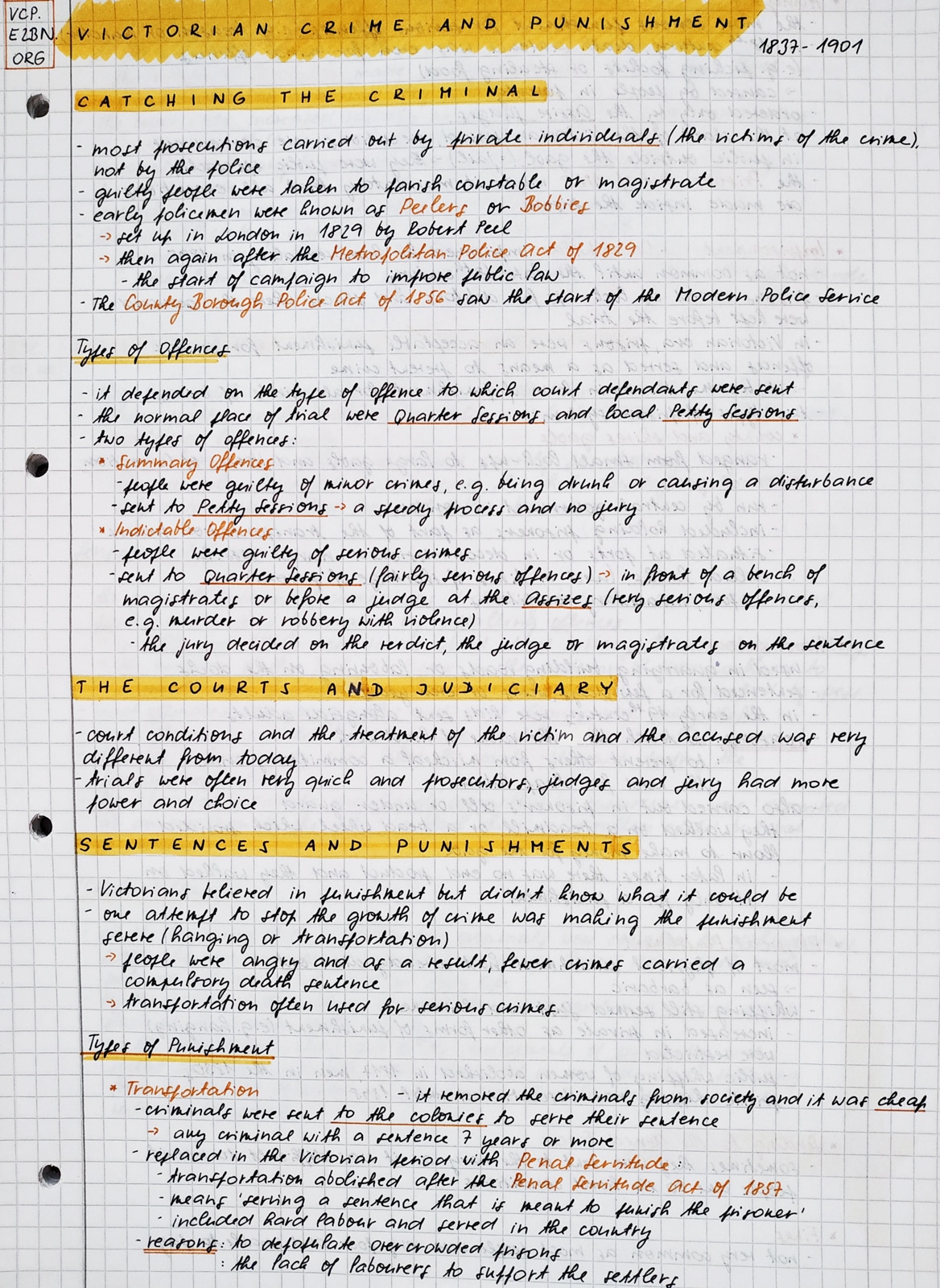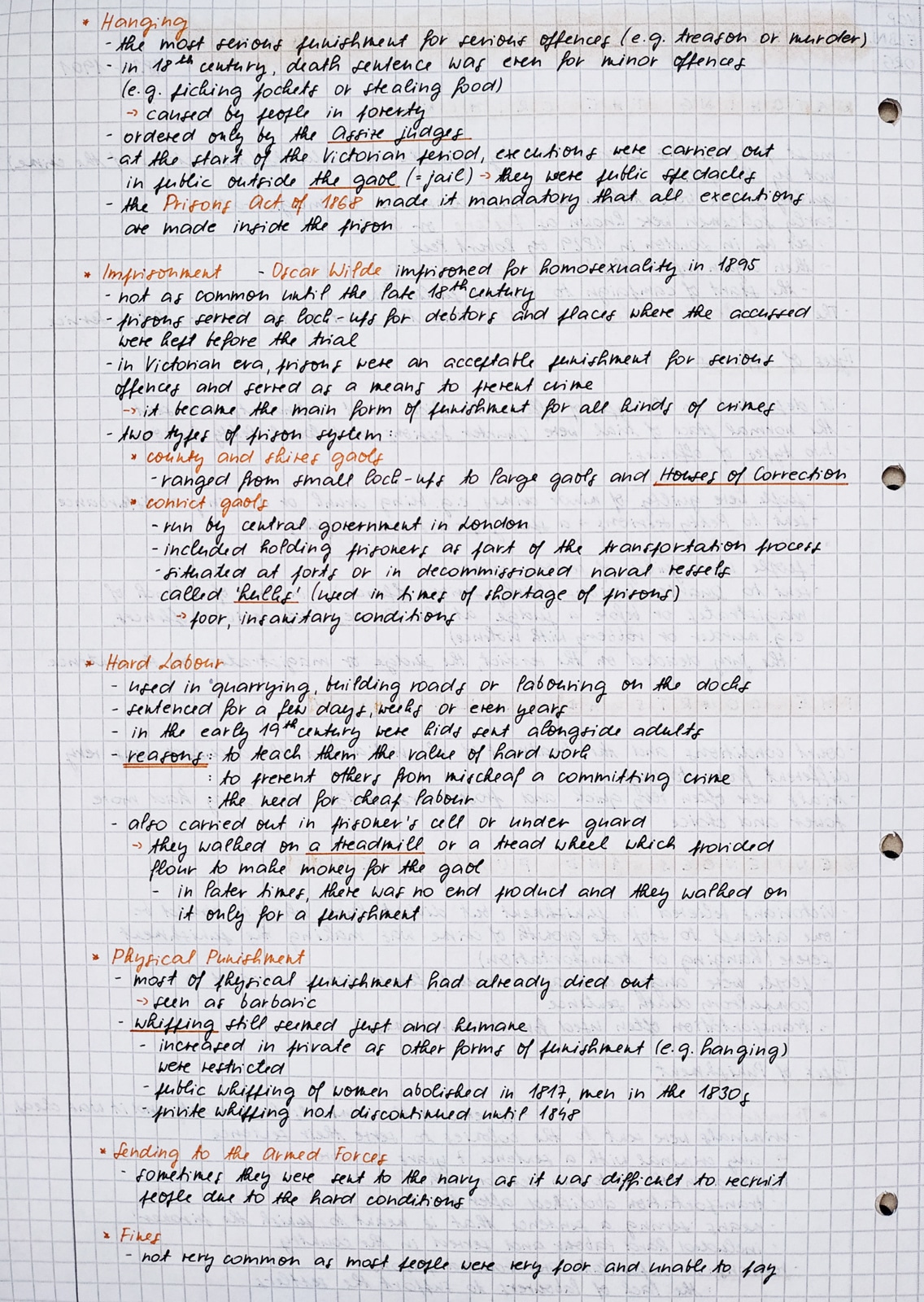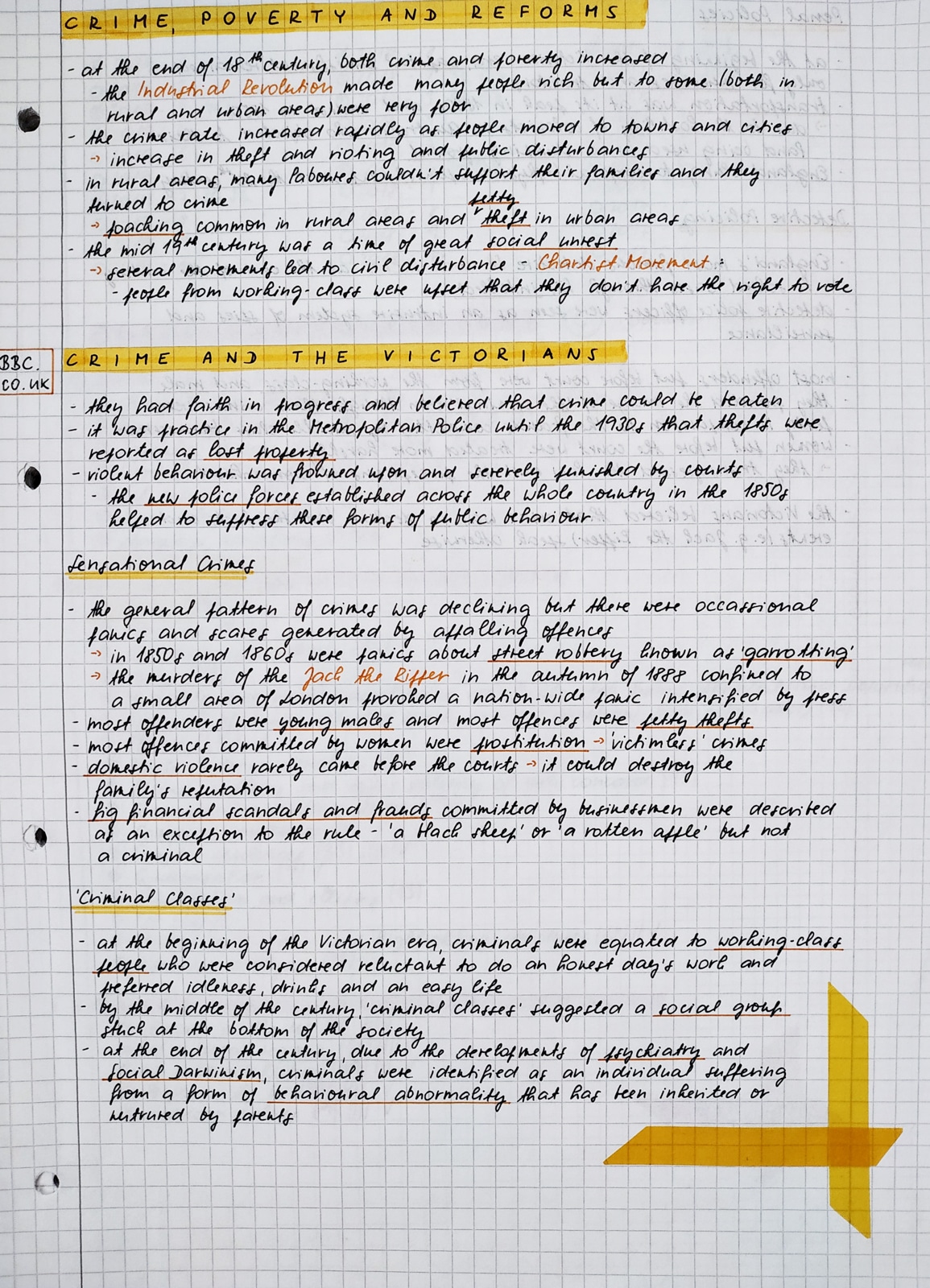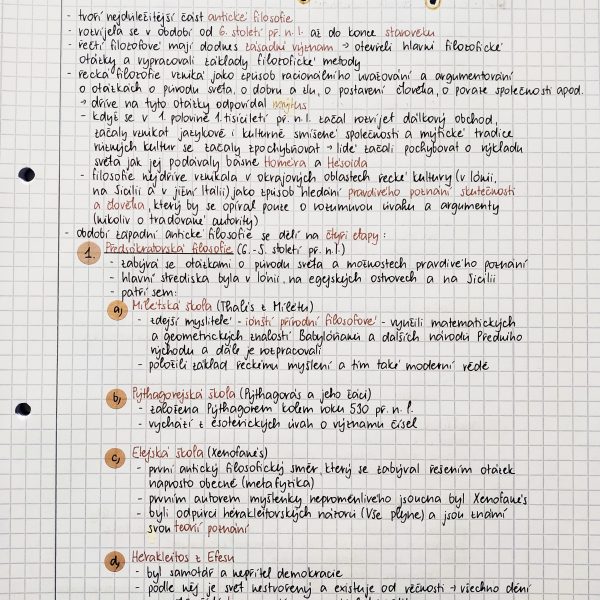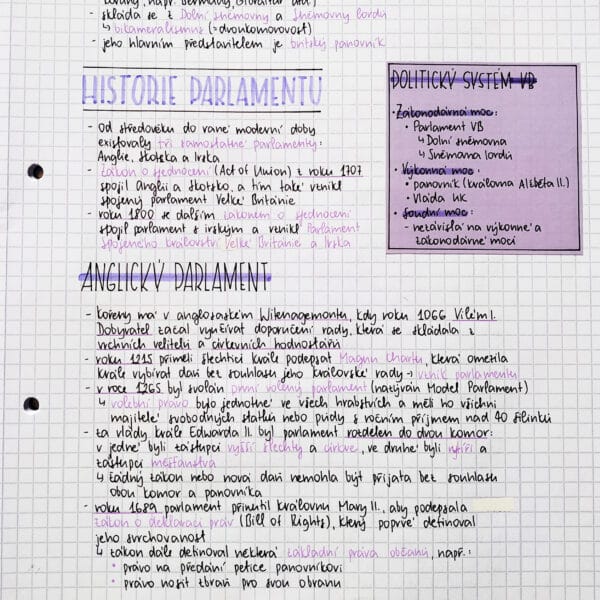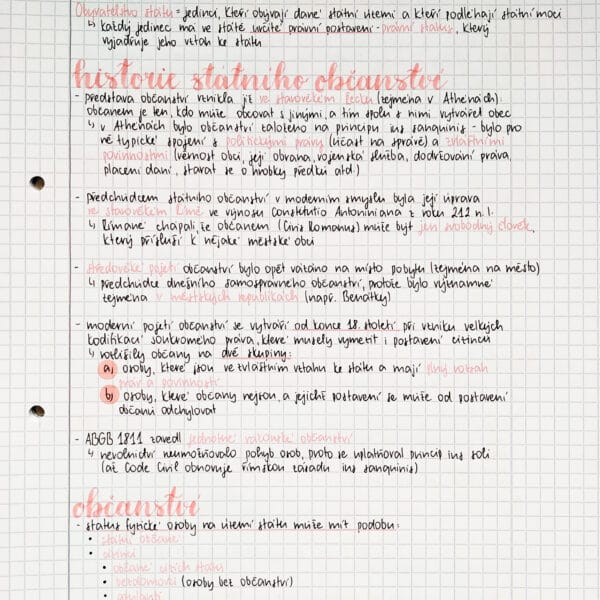Victorian Crime and Punishment
Catching the Criminal
- most prosecutions carried out by private individuals (the victim of the crime), not by the police
- guilty people were taken to parish constable or magistrate
- early policemen were known as Perlers or Bobbies
- set up in London in 1829 by Robert Peel
- then again after the Metropolitan Police Act of 1829 → the start of campaign to improve public law
- the County Borough Police Act of 1856 saw the start of the Modern Police Service
Types of Offences
- it depended on the type of offence to which court defendants were sent
- the normal place of trial were Quarter Sessions and local Petty Sessions
- two types of offences:
- Summary Offences
- people were guilty of minor crimes, e.g. being drunk or causing disturbance
- sent to Petty Sessions → a speedy process and no jury
- Indictable Offences
- people were guilty of serious crimes
- sent to Quarter Sessions (fairly serious offences) → in front of a bench of magistrates or before a judge at the Assizes (very serious offences, e. g. murder or robbery with violence)
- the jury decided on the verdict, the judge or magistrates on the sentence
- Summary Offences
The Courts and Judiciary
- court conditions and the treatment of the victim and the accused was very different from today
- trials were often very quick and prosecutors, judges and jury had more power and choice
Sentences and Punishment
- Victorians believed in punishment but didn’t know what it could be
- one attempt to stop the growth of crime was making the punishment severe (hanging or transportation)
- people were angry and as a result, fewer crimes carried a compulsory death sentence
- transportation often used for serious crimes
Types of Punishment
- Transportation
- criminals were sent to the colonies to serve their sentence → any criminal with a sentence 7 years or more
- it removed the criminals from the society and it was cheap
- replaced in the Victorian period with Penal Servitude:
- transportation abolished after the Penal Servitude Act of 1857
- means ‘serving a sentence that is meant to punish the prisoner’
- included hard labour and served in the country
- reasons:
- to depopulate overcrowded prisons
- the lack of labourers to support the settlers
- Hanging
- the most serious punishment for serious offences (e. g. treason or murder)
- in 18th century, death sentence was even for minor offences (e. g. picking pockets or stealing food) → caused by people in poverty
- ordered only by the Assize judges
- at the start of the Victorian period, executions were carried out in public outside the gaol (= jail) → they were public spectacles
- the Prisons Act of 1868 made it mandatory that all executions are made inside the prison
- Imprisonment
- not as common until the late 18th century
- Oscar Wilde imprisoned for homosexuality in 1895
- prisons served as lock-ups for debtors and places where the accused were kept before the trial
- in Victorian era, prisons were an acceptable punishment for serious offences and served as a means to prevent crime → it became the main form of punishment for all kinds of crimes
- two types of prison system:
- county and shires gaols
- ranged from small lock-ups to large gaols and Houses of Correction
- convict gaols
- run by central government in London
- included holding prisoners as part of the transportation process
- situated at ports or in decommissioned naval vessels called ‘hulks‘ (used in times of shortage of prisons) → poor, insanitary conditions
- county and shires gaols
- Hard Labour
- used in quarrying, building roads or labouring on the docks
- sentenced for a few days, weeks or even years
- in the early 19th century were kids sent alongside adults
- reasons:
- to teach them the value of hard work
- to prevent others from mischief and committing crime
- the need for cheap labour
- also carried out in prisoner’s cell or under guard → they walked on a treadmill or a tread wheel which provided flour to make money for the gaol
- in later times, there was no end product and they walked on it only for a punishment
- Physical Punishment
- most of physical punishment had already died out → seen as barbaric
- whipping still seemed just and humane
- increased in private as other forms of punishment (e. g. hanging) were restricted
- public whipping of women abolished in 1817, men in the 1830s
- private whipping not discontinued until 1848
- Sending to the Armed Forces
- sometimes they were sent to the navy as it was difficult to recruit people due to the hard conditions
- Fines
- not very common as most people were poor and unable to pay
Crime, Poverty and Reforms
- at the end of 18th century, both crime and poverty increased
- the Industrial Revolution made many people rich but some (both in rural and urban areas) were very poor
- the crime rate increased rapidly as people moved to towns and cities → increase in theft and rioting and public disturbances
- in rural areas, many labourers couldn’t support their families and they turned to crime → poaching common in rural areas and petty theft in urban areas
- the mid 19th century was a time of great social unrest
- several movements led to civil disturbances – Chartist Movement – people from working-class were upset that they don’t have the right to vote
Crime and the Victorians
- they had faith in progress and believed that crime could be beaten
- it was practise in the Metropolitan Police until the 1930s that thefts were reported as lost property
- violent behaviour was frowned upon and severely punished by courts
- the new police forces established across the whole country in the 1850s helped to suppress these forms of public behaviour
Sensational Crimes
- the general pattern of crimes was declining but there were occasional panics and scares generated by appalling offences
- in 1850s and 1860s were panics about street robbery known as ‘garrotting‘
- the murders of the Jack the Ripper in the autumn of 1888 confined to a small area of London provoked a nation-wide
- most offenders were young males and most offences were petty thefts
- most offences committed by women were prostitution → ‘victimless’ crimes
- domestic violence rarely came before the courts → it could destroy the family’s reputation
- big financial scandals and frauds committed by businessmen were described as an exception to the rule – ‘a black sheep’ or ‘a rotten apple’ but not a criminal
‘Criminal Classes’
- at the beginning of the Victorian era, criminals were equated to working-class people who were considered reluctant to do an honest day’s work and preferred idleness, drinks and an easy life
- by the middle of the century, ‘criminal classes’ suggested a social group stuck at the bottom of the society
- at the end of the century, due to the developments of psychiatry and Social Darwinism, criminals were identified as an individual suffering from a form of behavioural abnormality that has been inherited or nurtured by parents
Penal Policies
- at the beginning of the Victorian era, capital punishment remained only for murderers and traitors
- transportation was at its peak in 1830s and ended in 1850s → due to the hostility of colonists in Australia who objected to their land being used as a dumping ground
- England clung to corporal (= physical) punishment until the 20th century
Detective Policing
- England’s most famous detective Sherlock Holmes at the end of the century – he solved his cases through his intellect
- detective police officers were seen as an intrusive system of spies and surveillance
- most offenders put before court were from the working-class and male
- they provided the image of ‘the criminal‘ even though their crimes were petty in comparison to the frauds committed by middle-class businessmen
- women put before the court were treated more harshly → they transgressed the law and the perceptions of womanhood
- the Victorians believed that crime was in decline but the facts and events (e. g. Jack the Ripper) speak otherwise


